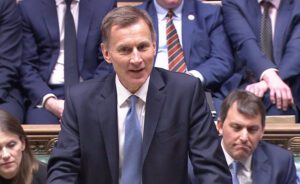The UK’s borrowing bill rose in April on the back of stubbornly high inflation forcing up the government’s debt interest payments.
Official figures showed that public sector borrowing climbed to £25.6 billion last month, up from £13.7 billion in the same month last year and overshooting forecasts from the government’s independent watchdog, the Office for Budget Responsibility.
The OBR in March projected borrowing to be at £22.4 billion in April on the back of higher government investment. Independent economists had projected a figure closer to £18 billion last month.
The Office for National Statistics said it was the second highest April borrowing on record, outstripped only by the one in 2020, in the depths of the pandemic. It said that borrowing was driven up by the cost of the government’s energy support scheme for households, higher benefits payments, and the rising cost of servicing debt.
The debt interest bill was £9.8 billion last month, the highest April figure on record and £3.1 billion higher than the same month last year.
The government services its index-linked debt based on the retail prices index measure of inflation (RPI), which hit a higher than expected 13.8 per cent in February, the month that April’s borrowing costs are linked to.
On the whole, the public finances have improved by more than expected this year, as the economy has managed to avoid a recession and the strong labour market has boosted tax revenues and reduced the government’s spending on benefits.
The ONS said that its estimate for borrowing for the financial year ending 2022-2023 was £137 billion, undershooting the £152 billion forecast from the OBR.
The ONS said that the debt ratio was 99.2 per cent of gross domestic product (GDP) in April, up marginally from March.
The government has promised to have total national debt as a proportion of the economy falling within the next five years, a key plank in the chancellor’s attempts to stabilise the public finances after last year’s mini-budget.
Jeremy Hunt said: “It is right we borrowed billions to protect families and businesses against the impacts of the pandemic and Putin’s energy crisis. But debt and borrowing remain too high now — which is why it’s one of our priorities to get debt falling. We’ve taken difficult but necessary decisions to balance the nation’s books, and if we stick to our plan and get our economy growing, then debt is set to fall.”
Moody’s investor service said this week that the chancellor would meet his target to get the debt ratio falling to around 90 per cent by 2028, but warned that borrowing would climb again until the mid-2040s on account of the country’s ageing population, requiring higher spending on public services.
Evan Wohlmann at Moody’s said: “Population ageing will lead to a gradual increase in healthcare and pensions spending as a share of GDP from the 2030s. As a result, the fiscal deficit will gradually widen to 5 per cent of GDP by 2040, compared with an average 4.8 per cent deficit in the decade leading up to the pandemic.”
Ruth Gregory, deputy chief UK economist at Capital Economics, said: “April’s public finances figures got the new fiscal year off to a shaky start. But we doubt this will prevent the chancellor from embarking on a fiscal splurge ahead of the next election.”
Read more:
UK borrowing rises by more than expected on higher debt bill


























